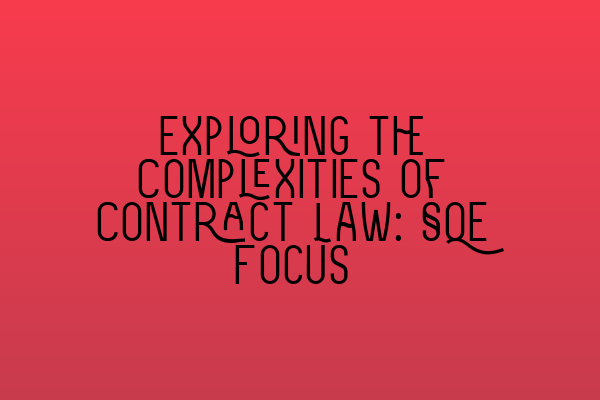Exploring the Complexities of Contract Law: SQE Focus
In the realm of legal practice, contract law plays a fundamental role in shaping business transactions and relationships. Whether you are an aspiring solicitor or an established legal professional, understanding the complexities of contract law is a crucial aspect of your expertise. In this blog post, we will explore the intricacies of contract law through the lens of SQE, the Solicitors Qualifying Examination.
What is the SQE?
The SQE, or Solicitors Qualifying Examination, has gained significant attention in recent years as the new assessment framework for aspiring solicitors in England and Wales. The SQE sets a standardized benchmark for the legal profession, ensuring that all solicitors possess the necessary skills and knowledge required for effective practice.
With the introduction of SQE, contract law has received renewed focus as one of the central subjects for aspiring solicitors. The examination evaluates candidates’ understanding of contract law principles, interpretation of contractual clauses, and application of legal provisions to real-life scenarios.
The Importance of Contract Law
Contract law governs nearly all business transactions and relationships, providing a legal framework and ensuring the enforceability of agreements. It establishes the rights and obligations of each party involved and provides remedies in case of disputes or breaches.
Understanding contract law is vital for both solicitors and individuals involved in business transactions. By grasping the intricacies of contract law, solicitors can provide valuable legal advice, draft robust contracts, and negotiate favorable terms for their clients.
The Complexities of Contract Law Under the SQE
Contract law, although seemingly straightforward, encompasses various complex facets that candidates must master in preparation for the SQE examination. The examiners assess candidates’ comprehension of key contract law principles, including offer and acceptance, consideration, intention to create legal relations, and certainty and completeness of terms.
Furthermore, the SQE scrutinizes candidates’ ability to interpret and analyze contractual clauses, as these clauses often contain hidden meanings and legal implications. Interpreting contractual clauses involves considering various factors, such as the parties’ intentions, industry customs, and the legal context surrounding the agreement.
To excel in the SQE examination, candidates must navigate through the intricacies of contract law, diving deep into the subject matter to understand the subtle nuances that can greatly impact the outcome of a legal dispute.
Relevant Articles for Further Insight
For a more comprehensive understanding of contract law and its implications, we recommend exploring the following articles:
- Exploring the Impact of Frustration on Contractual Obligations: Legal Insights
- Interpreting Contractual Clauses: Unlocking the Hidden Meanings
- Legal Aspects of Business Contracts: Key Considerations for Entrepreneurs
- SQE Contract Law vs. Traditional Qualifications: A Comparative Analysis
- Agreements in Contract Law: Understanding Its Various Types
These articles provide in-depth insights into various aspects of contract law, helping you gain a comprehensive understanding of the subject matter and its implications in real-world scenarios.
Conclusion
Contract law forms the backbone of legal practice, and a solid understanding of its complexities is essential for a successful career in law. Whether you are preparing for the SQE examination or seeking to broaden your knowledge, delving into the intricacies of contract law will not only enhance your expertise but also enable you to provide effective legal solutions to your clients.
For further guidance on contract law and related topics, we encourage you to explore the articles we have linked above. By delving into these resources, you will gain valuable insights that will prepare you for the challenges of the SQE examination and elevate your proficiency in contract law.
Remember, the more you explore and understand the complexities of contract law, the better equipped you will be to navigate legal disputes and ensure favorable outcomes for your clients.
